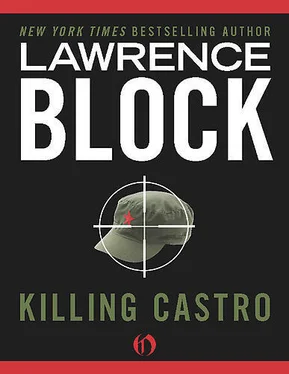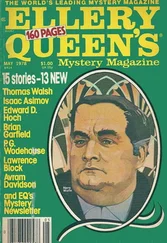“Come on,” Turner said. “Everybody’s got an angle. What’s yours?”
“I’m not an idealist,” Hines said.
“No?”
“No. I had a brother, Turner. An older brother, six years older than I am. He was an idealist, Turner.”
“Yeah?”
“Just shut up and listen. He was an idealist, a great guy. I loved the bastard. You got that? He taught me things, spent a lot of time with me. It was the older brother-younger brother bit and I loved him for it. So Castro went up against Batista and Joe—my brother—went to the hills to help out. He didn’t come in on the tail end. He was there almost from the beginning, before half the people in this country ever heard of Castro. He was there. He fought and he starved and he was there when they won. You got that?”
Turner looked at him.
“So this brother of mine was there, and they won when everybody expected them to lose. They were just a band of kids with beards fighting a professional army and, damn it, they won. And Castro was on top.”
Turner lit another cigarette. Hines stopped for a minute. This was the hard part, this was where it got tough to keep going. But he had to get it out, it was important now and he had to tell Turner. Somehow, it was important that Turner be told.
“This Castro,” he said, “he got on an anti-American kick. And there was Joe, an American, an idealist. He was on Castro’s side, but he was still an American.” He paused for breath and then went on. “Castro called it revolutionary justice. He said Joe Hines betrayed the revolution and had to get his. With revolutionary justice you don’t need a trial. All you need is a firing squad. They took my brother, put him in front of a firing squad and shot him deader than hell. So I’m going to Cuba, Turner, and I’m going to kill this son-of-a-bitch, Castro, and if that’s idealism you can shove it straight up your ass.”
Neither of them said anything for a while. Then Turner got up, took the coffee cups, carried them to the kitchen. Hines sat in his chair and looked at his hands. They were not trembling. I’m steady as a goddamn rock, he thought. No shakes or nothing. Just steady. Gibraltar.
Turner came back, handed him a cup of coffee. They drank in silence. When they set down empty cups Turner offered him a cigarette. He shook his head and Turner lit one for himself.
“What I said before,” Turner apologized, “about you grabbing a plane and going home. Just forget I said it, okay?”
“Sure.”
“How old are you, Hines?”
“Nineteen. Why?”
“No reason. You ever have a woman?”
Hines looked at his hands. He took a deep breath.
“Well? Did you?”
“No.”
“Don’t be ashamed of it, for Christ’s sake. Look, it’s late, we’re both tired. There are bedrooms in the back. We’ll sack out for eight hours, then send out for some food and some liquor. You drink?”
“Sure.”
“Good,” Turner said. “We’ll get some food and we’ll get some liquor, and I’ll call somebody on the phone and get a couple of girls. We’ll eat the food and we’ll drink the liquor and we’ll lay the girls. Then we’ll go to Cuba and get our asses shot off. That sound okay to you?”
“Sure,” Hines said.
“Fine,” Turner said. “Now let’s get some sleep.”
Fidel Castro was born on the thirteenth of August in 1926. His father was a Spaniard, a Galician who settled in Oriente Province and became rich from sugar and lumber. Fidel grew up on his father’s farm at Biran, in the municipality of Mayari on the north coast of Oriente, near Nipe Bay. He ran barefoot in his father’s fields, hauled lumber with a tractor. He was baptized as a Roman Catholic and went to church schools in Santiago.
Fidel Castro was seven years old when Batista took over the island. Fulgencio Batista, a tough-minded sergeant in the Cuban Army, managed to rally the armed forces around him and grab power in the turmoil surrounding the revolt which ousted Machado. The young Fidel Castro grew to maturity in Batista’s Cuba, an island where personal liberty was ground out beneath the iron heel of dictatorship.
He attended the Christian Brothers’ Colegio La Salle, then transferred to complete his grade school education at the Jesuit Colegio Dolores. He played a bugle in the school band and wore his first uniform, a navy-blue outfit with a white Sam Browne belt.
In 1942, while the rest of the world abandoned itself to the early years of the second world war, Fidel was sent to high school in Havana at the Colegio Belen. It was there that his talents for leadership came to the foreground. He was outstanding in his studies and in athletics as well, pitching for the baseball team, playing basketball, running for the track squad. By the time he graduated in June of 1945, he had made his choice of a vocation. He was going to become a lawyer.
The University of Havana, where Fidel Castro enrolled in the fall of that year, was a fundamentally different sort of place from North American universities. Latin American colleges have, throughout history, played a predominant role in the politics of their nations. Revolutions and uprisings are fomented there, radical thought is encouraged. Panty raids and homecoming rallies are unknown in Latin American colleges. Latin American students have weightier concerns to occupy their time.
It was at the university that Fidel’s future was molded. He entered the Law School, became embroiled in student affairs. He was an impressive figure—tall, good-looking, with strong features, a quick mind, and a fine speaking voice. In a short time he had become a prominent campus figure, an artist at political manipulation.
But in the summer of 1947 Castro’s revolutionary zeal interrupted his academic studies. He joined an expeditionary force training in the hills of Oriente, preparing to invade the Dominican Republic to overthrow Trujillo, the island republic’s long-term dictator. There Fidel got his first taste of military life, a taste which developed with the years.
The invasion was premature, and a failure. The Dominican government got wind of the plans and sent a note of protest to the Cuban government. The Cuban president was quick to co-operate with Trujillo. Frigates of the Cuban navy intercepted the invasion force and squelched the attempt. Castro himself jumped overboard with his submachine gun in hand and swam to shore holding the gun high overhead.
Fidel returned to the university once more and turned his sights on campus politics. He accepted Communist support in the campaign for election to the vice-presidency of the Law School’s student government, then spun around to unleash a spirited campaign against the campus Communists. When the president resigned, Castro stepped to the helm of the student government.
He was learning. He was a natural politician, quick to sense the twists and turns of the game, ready to cement allegiances for his own personal gain. He was a pragmatic idealist—his goals were high and worthy, but he was willing to use less than idealistic means to achieve those goals. Fidel went on, continuing with his studies, advancing himself as a politician. Cuban politics were disorganized at the time. Batista had been living abroad in voluntary exile at Daytona Beach, Florida, since 1944; in that year he had finally held an honest election, the first since 1933, and had been beaten badly. But the administration which followed Batista was almost as corrupt, furthering the interests of the Cuban upper classes to the exclusion of the poor. Fidel dreamed of a free Cuba, her land redistributed to the peasants, her citizens equal before the law. In 1948 Fidel married; a year later his first son was born. In 1950 he graduated from the University of Havana and hung out his shingle as a lawyer. His idealism prevailed, and he spent the bulk of his time defending men and women of the lower classes, rarely collecting a fee. The common people of Havana knew Castro. They saw him as a good man, a man with their interests at heart. And how did Castro see himself? As an embryonic politician, a man with a future in Cuba. In those days, living in Havana, defending the poor in the Cuban courts, maybe Fidel Castro did not dream of revolutions. After all, Batista was in exile in Florida. The government was corrupt and reforms were needed desperately, but maybe he figured there was no reform which could not be achieved through legal means.
Читать дальше












